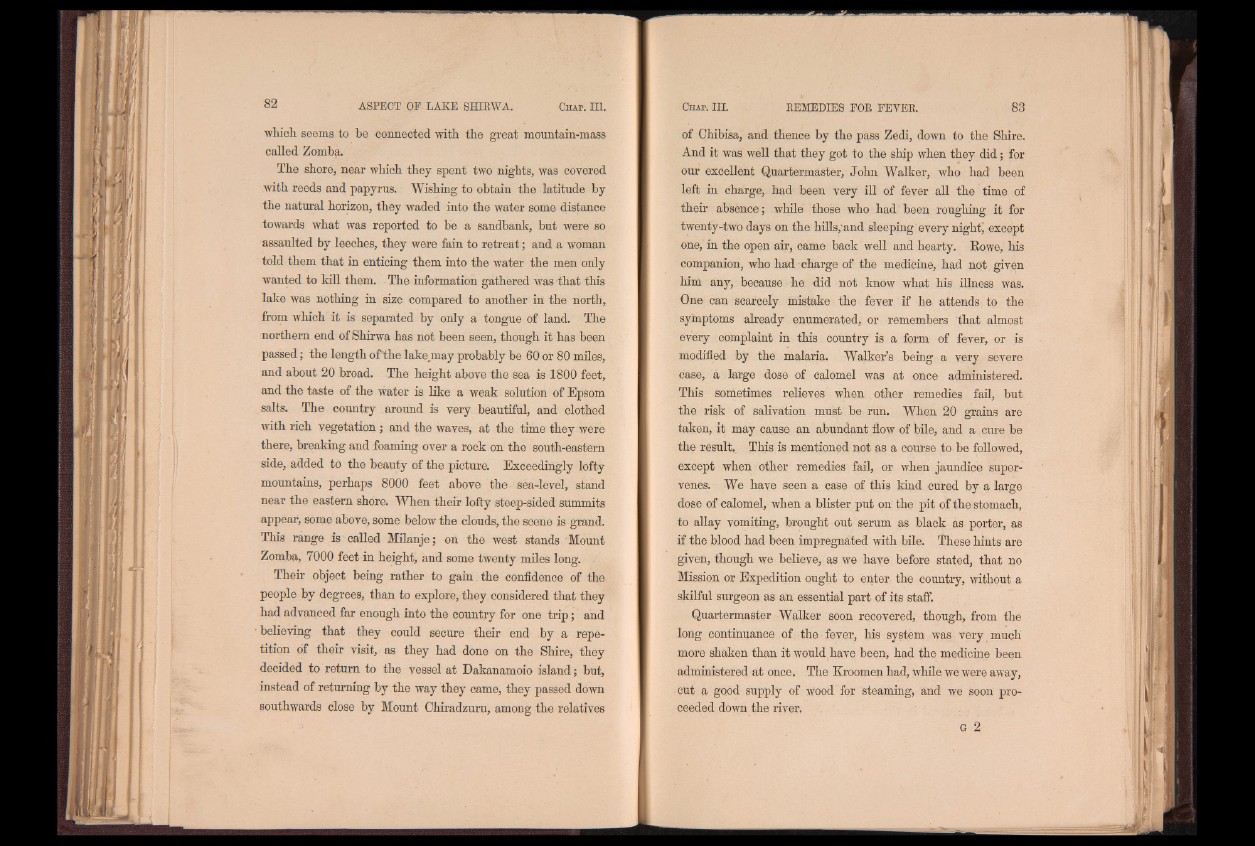
which seems to be connected with the great mountain-mass
called Zomba.
The shore, near which they spent two nights, was covered
with reeds and papyrus. Wishing to obtain the latitude by
the natural horizon, they waded into the water some distance
towards what was reported to be a sandbank, but were so
assaulted by leeches, they were fain to retreat; and a woman
told them that in enticing them into the water the men only
wanted to kill them. The information gathered was that this
lake was nothing in size compared to another in the north,
from which it is separated by only a tongue of land. The
northern end of Shirwa has not been seen, though it has been
passed; the length ofthe lakejnay probably be 60 or 80 miles,
and about 20 broad. The height above the sea is 1800 feet,
and the taste of the water is like a weak solution of Epsom
salts. The country around is very beautiful, and clothed
with rich vegetation; and the waves, at the time they were
there, breaking and foaming over a rock on the south-eastern
side, added to the beauty of the picture Exceedingly lofty
mountains, perhaps 8000 feet above the sea-level, stand
near the eastern shore. When their lofty steep-sided summits
appear, some above, some below the clouds, the scene is grand.
This range is called Milanje; on the west stands Mount
Zomba, 7000 feet in height, and some twenty miles long.
Their object being rather to gain the confidence of the
people by degrees, than to explore, they considered that they
had advanced far enough into the country for one trip ; and
believing that they could secure their end by a repetition
of their visit, as they had done on the Shire, they
decided to return to the vessel at Dakanamoio island; but,
instead of returning by the way they came, they passed down
southwards close by Mount Chiradzuru, among the relatives
of Ohibisa, and thence by the pass Zedi, down to the Shire.
And it was well that they got to the ship when they did; for
our excellent Quartermaster, John Walker, who had been
left in charge, had been very ill of fever all the time of
their absence; while those who had been roughing it for
twenty-two days on the hills,’and sleeping every nightj except
one, in the open air, came back well and hearty. Bowe, his
companion, who had charge of the medicine, had not given
him any, because he did not know what his illness was.
One can scarcely mistake the fever if he attends to the
symptoms already enumerated, or remembers that almost
every complaint in this country is a form of fever, or is
modified by the malaria. Walker’s being a very severe
case, a large dose of calomel was at once administered.
This sometimes relieves when other remedies fail, but
the risk of salivation must be run. When 20 grains are
taken, it may cause an abundant flow of bile, and a cure be
the result.. This is mentioned not as a course to be followed,
except when other remedies fail, or when jaundice supervenes.
We have seen a case of this kind cured by a large
dose of calomel, when a blister put on the pit of the stomach,
to allay vomiting, brought out serum as black as porter, as
if the blood had been impregnated with bile. These hints are
given, though we believe, as we have before stated, that no
Mission or Expedition ought to enter the country, without a
skilful surgeon as an essential part of its staff.
Quartermaster Walker soon recovered, though, from the
long continuance of the fever, his system was very much
more shaken than it would, have been, had the medicine been
administered at once. The Kroomen had, while we were away,
cut a good supply of wood for steaming, and we soon proceeded
down the river.
G 2